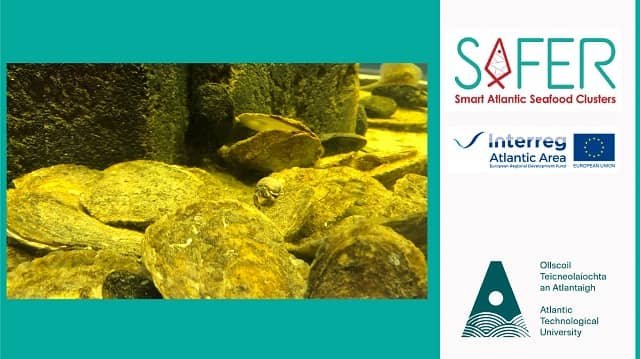WiSAR Lab will be piloting the remote monitoring of water quality in S2AQUAcoLAB (Portugal).

Interreg Atlantic Area funded SAFER partnership through its Open Call awarded 5 organisations in the Atlantic Area to implement Industry 4.0 technological solutions that provide efficient processes, improved and sustainable production.
One of the awarded organisation S2AQUA, Collaborative Laboratory, Association for a Sustainable and Smart Aquaculture (S2AQUAcoLAB) in Portugal will implement IoT (Internet of Things) based wireless solution to remote monitoring water quality developed by SAFER project partner WiSAR Lab (Ireland).
IoT (Internet of Things) systems have a wide range of applications and can be applied to monitor environmental or other conditions to provide real time information and inform better decision making. These systems use wireless technology to sense environmental conditions such as water oxygen levels, chlorophyll and temperature and send the data back to a remote database which can be accessed anywhere, anytime.
S2AQUAcoLAB is a private non-profit institution founded in 2021, whose mission is to elevate aquaculture to a new level by playing an interface role between academia, research and industry.
S2AQUAcoLAB is starting a monitoring program, manually sampling four strategic locations on a fortnightly frequency to measure abiotic parameters (temperature, salinity, dissolved oxygen, pH) and study phytoplankton communities.
However, an autonomous system with a higher sampling frequency can provide a more in-depth analysis of the difference scales of the oceanographic processes affecting the local shellfish species. The WiSAR solution will enhance the ability of S2AQUAcoLAB to better understand environmental changes and develop a predictive data model for Ria Formosa bivalves’ production. This model will help producers to improve, manage and reduce aquaculture losses related to extreme events.
In addition, the data produced by this solution can contribute to a better understanding of pathology events and, promote an overall improvement of the ecosystem management as a production site and as one of the most important wetlands of Portugal.
“Real-time environmental data is critical for today’s aquaculture operators as it helps to safeguard fish stocks, optimise production and operate in a safe, sustainable manner”, explains Dr Nick Timmons, Academic Director of the WiSAR Lab, ATU Donegal.
Stay Always Informed
Join our communities to instantly receive the most important news, reports, and analysis from the aquaculture industry.
“We are delighted to be collaborating with our Portuguese partners, S2AQUAcoLAB, through project SAFER, in the transfer of these cutting-edge environmental monitoring tools, for more sustainable and productive aqua farming practices.”
Contact
Maixa Zabaleta
ERNACT Network
Email: maixa.zabaleta@ernact.eu
Editor at the digital magazine AquaHoy. He holds a degree in Aquaculture Biology from the National University of Santa (UNS) and a Master’s degree in Science and Innovation Management from the Polytechnic University of Valencia, with postgraduate diplomas in Business Innovation and Innovation Management. He possesses extensive experience in the aquaculture and fisheries sector, having led the Fisheries Innovation Unit of the National Program for Innovation in Fisheries and Aquaculture (PNIPA). He has served as a senior consultant in technology watch, an innovation project formulator and advisor, and a lecturer at UNS. He is a member of the Peruvian College of Biologists and was recognized by the World Aquaculture Society (WAS) in 2016 for his contribution to aquaculture.







